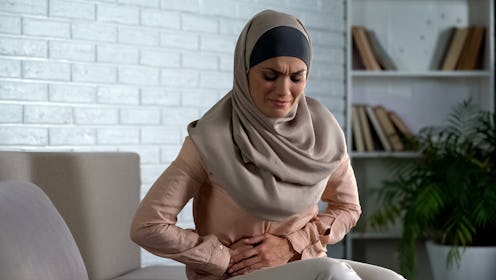Life
6 Health Issues That Aren’t Actually Period-Related, Even Though Everyone Thinks They Are

If you suddenly begin having very painful period cramps or bleeding in the middle of your cycle, you might immediately assume that you have a period problem. But there are actually a number of health issues that seem like your period, but aren't actually closely related, according to experts.
"It's common for periods to be irregular when you first start getting them. Over time, you’ll notice your period and the effects that come with it start to change," Dr. Abby Hyams, MD, MBChB, DRCOG, DFFP, MRCGP, a general practitioner at Medicspot, tells Bustle. "As you age, your menstrual cycles tend to get shorter and more regular, usually occurring once a month at the same time and for the same length," she says. Tracking your period through an app or a physical calendar can help you see what patterns are typical for your body and clue you in to any abnormalities.
While starting birth control could have an effect on your periods, if you notice distinct and sudden changes, this can be a cause for concern, Hyams says. You could be experiencing an issue that may or may not be related to your period.
Here are some health problems that seem period-related, but are actually caused by something else, according to experts.
1A Hernia
"Hernias are a common source of pain and a very easily missed source of pelvic pain, often times missed by radiologists, OB/GYNs and primary-care physicians," Dr. Sallie Sarrel, PT ATC DPT, a pelvic physical therapist specializing in endometriosis and occult or no-bulge hernia, tells Bustle. These can often cause pelvic and genital pain that can seem like period cramps, she says. "To make matters worse, the herniated tissue in the extra-peritoneal space becomes inflamed during the menstrual cycle," Sarrel says, so even though it might worsen during your period, it might be something else entirely. If you're experiencing significant pelvic pain, make an appointment with your doctor.
2Painful Bladder Syndrome
Many people who get a period experience cramps during that time of the month. But your cramping could potentially be coming from a nearby area of the body if you experience it when you aren't bleeding. "Painful bladder syndrome [is] an inflammation of the bladder wall that causes cramping that people often think is menstrual cramps but is bladder pain," Sarrel says. This can be especially present in patients with endometriosis, she says, and many doctors overlook the condition as a source of pain. While period cramps usually subside in a few days, if you find yourself experiencing lasting pain, see a professional for help.
3Diastasis Recti
Giving birth to a baby can be very painful. But even after the baby is born, you could be experiencing period-like pains that aren't actually related to your period. "After pregnancy [...] there can be a splitting of the abdominal sheath," Sarrel says. During menstruation, this pain in your abdomen can seem like it's normal cramping, when it's actually abdominal wall pain. If you've recently given birth and you're experiencing these abdominal pains — especially if they're different from the period cramps you experienced prior to pregnancy — bring it up at your next appointment.
4Hypothalamic Amenorrhea
You probably don't get super excited every time you get your period each month, but if you suddenly lose it, that can definitely be cause for concern. If your period stops you might immediately assume it's a period-related issue, but that isn't always the case. People who stop menstruating may have hypothalamic amenorrhea (HA), a condition where someone does not get their period, Dr. Kate Shkodzik, MD, an OB/GYN and medical advisor at Flo Health, tells Bustle. This condition can develop due to an eating disorder, stress, or too much exercise, she says. If you stop getting a normal period, it's definitely time to check in with your doctor to figure out what's wrong.
5Constipation
"Pelvic pain similar to those you may experience during your period can be caused by other conditions. The most common is constipation," Hyams says. Whether you are constipated regularly or mostly during your period, this can be a frustrating condition. If you take a period-specific over-the-counter pain medication, it might contain caffeine, which can help dehydrate you and lead to constipation. You also could be eating different foods during your period due to cravings, which can disrupt your normal digestive rhythm. While constipation is a relatively minor issue, it can still be pretty uncomfortable, so it's worth checking in with your doctor if you're having trouble passing stools on a regular basis.
6Pelvic Inflammatory Disease (PID)
If you're experiencing period-like cramps or bleeding when you aren't on your period, you might assume that you're just having an extra period. But this may not be the case. Pelvic inflammatory disease is an infection of the reproductive organs of a person who gets a period that is often caused by some sexually transmitted infections like chlamydia and gonorrhea, Shkodzik says. "PID can cause cramps not related to menstruation, abnormal discharge, and abnormal vaginal bleeding." If you've been having period symptoms when you aren't on your period and haven't been tested for STIs lately, you might want to book an appointment.
Everyone can experience periods differently, so you're the best person to notice that something isn't normal for your body. If you're ever in doubt about whether what you're experiencing is cause for concern or not, it's always a good idea to consult a doctor.